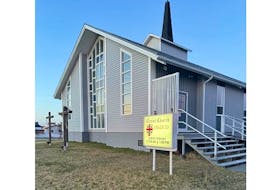ST. JOHN'S, N.L. — The woman held her fingers apart to measure about a couple of inches as she described what she was expecting from the government after requesting her child protective services files from several decades ago.
Instead she got just five pages, including the order declaring her a neglected child, a short doctor’s letter from 1954 declaring her fit to be adopted and a description of her unwed mother’s decision to give her up.
“I can’t take her. I can offer no plan,” the unwed mother was reported to have said at the time of permanently giving up her child in 1954.
“She is described as attractive and very loveable in manner,” the history of the ruddy-complexioned child to be adopted states.
It stops short of any mention of her subsequent adoption and the life-long pain the woman said she endured because of it.
“It’s shocking. Crap happens to good people,” the woman said.
“I’ll never give up … (but) even if nothing comes out of it, I had my story told.”
The file doesn’t seem to mention her time spent in an orphanage prior to adoption around age five.
“I can remember it as plain as yesterday,” she said.
The woman’s story was first told in The Telegram in January. The Telegram isn't naming her, at her request.
“I’ll never give up … (but) even if nothing comes out of it, I had my story told.”
Though she kept a journal about her life experiences, a little red journal doesn't constitute the paper trail the courts need if she were to pursue a case as a sexual abuse victim.
The woman, a senior citizen, had approached a lawyer about her case, but was waiting on the documentation from the government before anything could go ahead.
With just a few pages and nothing to add to the case, the woman said she will take a break now and continue to attend group therapy sessions.
She is clearly disappointed by the outcome.
The woman had been waiting since October 2017 and received the documents in recent weeks.
Long waits for such documents are nothing new. But in January, the Department of Children, Seniors and Social Development told The Telegram in an emailed response that "additional resources have been allocated and strategies have been implemented to increase efficiency in an effort to reduce wait times for the release of information to individuals who have requested access to their own records."
The woman's red diary describes a hard life experienced by too many children born into tough circumstances decades ago.
The woman's mother was unwed in 1949 when she gave birth in St. John's. After a stint at a place called Waterford Hall, the girl was signed over to child welfare and eventually placed in a St. John's orphanage, and was adopted at about age four.
The journal details an unfortunate life of emotional abuse and lack of affection from her adoptive parents, and alleged sexual abuse by a boarding house tenant, a neighbour and a doctor. None of that can be substantiated without documentation.
The outfall of such a hard, early start — abandonment, possible abuse, a loveless home — led, as it often does, to more unhappy events, including depression, and money and relationship struggles. She found out her birth father was married at the time of her conception.
"There were no help line phones back then. There was no person to intercede on my behalf. I wrote letters to Child Welfare, mailed them myself. Whether they received them, I do not know."
Although the woman was adopted, legislation at the time would have mandated how often a social worker had to visit the home within the first six months before the director of welfare agreed to prepare a certificate for the court saying the home was fit.
No such reports were released to her, though.
In her diary, the woman claims to have taken some action herself as a child after her adoptive parents did not believe it when she told them of the sexual abuse. She wrote in her diary:
"There were no help line phones back then. There was no person to intercede on my behalf. I wrote letters to Child Welfare, mailed them myself. Whether they received them, I do not know."
Neither the letter nor any mention of it turned up in the documents released to the senior.
The woman said she was 10 or 11 when she wrote the letters.
"I just put down Department of Child Welfare, Harvey Road, St. John's, Newfoundland," she said.
(The building burned down during the Harvey Road fire of 1992.)
RELATED









